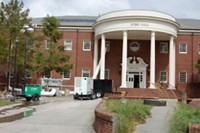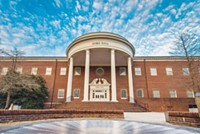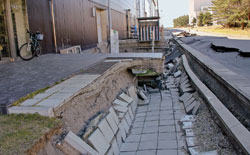Advertisement
Grab your lab coat. Let's get started
Welcome!
Welcome!
Create an account below to get 6 C&EN articles per month, receive newsletters and more - all free.
It seems this is your first time logging in online. Please enter the following information to continue.
As an ACS member you automatically get access to this site. All we need is few more details to create your reading experience.
Not you? Sign in with a different account.
Not you? Sign in with a different account.
ERROR 1
ERROR 1
ERROR 2
ERROR 2
ERROR 2
ERROR 2
ERROR 2
Password and Confirm password must match.
If you have an ACS member number, please enter it here so we can link this account to your membership. (optional)
ERROR 2
ACS values your privacy. By submitting your information, you are gaining access to C&EN and subscribing to our weekly newsletter. We use the information you provide to make your reading experience better, and we will never sell your data to third party members.
Education
UNC Wilmington chemists relocate in wake of Hurricane Florence
Recovery from the storm could take months or longer after the chemistry building suffered significant damage
by Andrea Widener
October 31, 2018
| A version of this story appeared in
Volume 96, Issue 44

Chemists at the University of North Carolina, Wilmington (UNCW), are relocating their research labs and classes in the wake of Hurricane Florence. Dobo Hall, home to the chemistry and biology departments, suffered significant water damage in the storm, which hit the campus on Sept. 14.
UNCW chemistry department chair Paulo F. Almeida says school officials are still assessing the damage. “I know we suffered losses; we just don’t know the extent of them.”
The eye of Hurricane Florence made landfall on the coast adjacent to Wilmington, and evidence of its destruction was widespread on the UNCW campus, says Aswani Volety, dean of the College of Arts & Sciences. More than 220 trees blew down, and several student housing and academic buildings were damaged. But Dobo Hall fared the worst.
As Florence came ashore, the protective rubber membrane covering the building’s flat roof peeled back. The hurricane’s slow trajectory meant that over 70 cm of rain fell in the area, and the water made its way throughout the building. “Not every lab and not every office is flooded, but a good chunk of them were,” Volety says.
The water soaked ceiling tiles and ruined drywall, carpets, and wooden furniture. Papers and books in its path were destroyed. A half-dozen labs suffered significant damage. “There was water standing in the labs; I don’t know exactly how high—at least several inches,” says Almeida, who took over as chair in July. “In some labs it was a very messy situation.”
The department and university had taken the initial threat from Hurricane Florence seriously. Faculty, students, and staff covered equipment with plastic sheeting and moved it away from windows if possible. The school closed down two days before the hurricane arrived.
Most of the chemistry department evacuated Wilmington; Almeida, for example stayed with a student near Raleigh, N.C. Almeida first learned that Dobo Hall sustained significant damage when a few of those who stayed behind went in to assess the building after the storm passed.
Among the most immediate problems was lack of power. The building has its own generators, but UNCW’s facilities department shut them down when the building flooded to prevent anyone from being electrocuted. That left freezers filled with biological samples vulnerable to thawing. “This was the one building we couldn’t afford to go down,” Volety says.
Volety made saving samples his “first order of business” after the hurricane moved inland, he says. Facilities workers moved whole freezers to undamaged buildings, prioritizing those with the most precious samples, including some from Antarctica. Staff had to navigate debris, such as fallen ceiling tiles, as well as ease some freezers down stairs. “The facilities department did a fantastic job,” Volety says. Almost all the samples appear to have survived.
However, it quickly became clear that no one was going to be able to move back into Dobo Hall this semester, and possibly not for months or years. “Most labs were affected to some extent,” Almeida says.
For now, the chemistry department is focused on getting through the semester, which is going to be crammed into a shorter period of time. Classes, which resumed Oct. 8, are being held on the main campus in buildings that were not damaged. Instructional labs will mostly be replaced by demonstrations and online instruction, Almeida says, though the school is looking into renting portable labs for the spring.
Advertisement
Meanwhile, the department is moving its research labs into open research and commercial space in UNCW’s Center for Marine Science and the nearby marine biotechnology building, a 15-minute drive from the main campus. The chemistry department hopes to find space for all the graduate student offices there as well.
Researchers might not know the full extent of the damage to their infrastructure until all the equipment has been moved and started up, Almeida says. Luckily, the department’s nuclear magnetic resonance instruments and its chemical supply rooms are mostly intact, as are the chemistry department’s administrative offices.
However, “it is inevitable there are going to be delays in the work,” Almeida says. Access to Dobo Hall has been limited because it’s not safe inside. Facilities staff accompanied researchers inside to collect important items and begin the moving process.
The department is still deciding whether to move major equipment like the NMRs to the new research space; that will depend on how long it will take to repair Dobo Hall, which is still under evaluation.
“It’s going to be difficult, but we are going to make it,” Almeida says. “Talk to me in two or three years.”
UPDATE:
This story was originally published online on Oct. 15, 2018. It was updated on Oct. 31, 2018, to reflect the fact that although Aswani Volety is still dean of UNCW’s College of Arts & Sciences, he is no longer director of the Center for Marine Science.





Join the conversation
Contact the reporter
Submit a Letter to the Editor for publication
Engage with us on Twitter